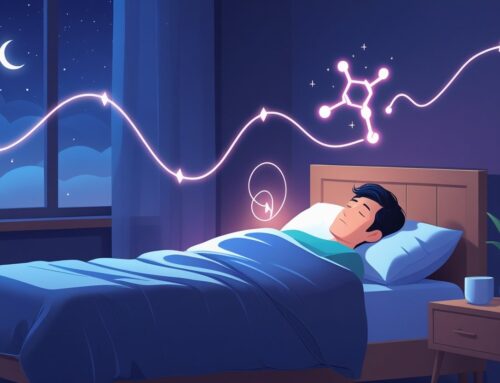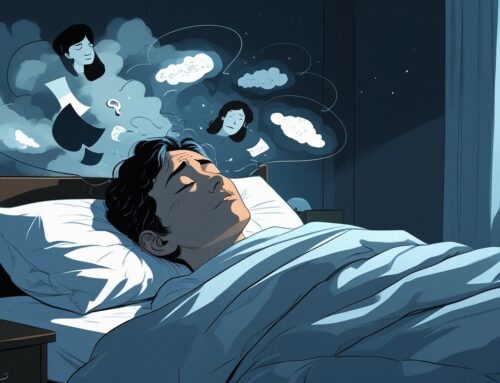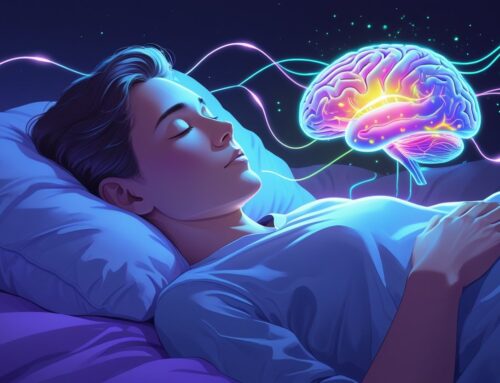Alzheimer’s disease disrupts normal sleep patterns, which makes rest difficult for both those affected and their caregivers. Many people find it tough to fall asleep, wake up several times throughout the night, or nap too much during the day. These patterns can leave both the person and their caregiver feeling exhausted. Over time, the lack of steady rest can make symptoms worse and take away from daily quality of life.
The brain changes caused by Alzheimer’s are a big reason for these sleep problems. Some people wake up confused at night, while others end up sleeping during the day and staying restless at night. Knowing how these changes show up is an important step in helping manage rest and keeping health more steady.
Finding ways to improve sleep takes patience and care. Sometimes small changes in routine help, and other times professional support is needed. Better sleep can ease confusion, improve mood, and provide more stability. For caregivers, it can also mean fewer long nights and a more manageable daily rhythm.
Key Takeaways
- Sleep issues are very common and tend to worsen as Alzheimer’s progresses.
- Brain changes directly affect how well and when someone sleeps.
- Managing sleep requires personal strategies and often guidance from a doctor or caregiver.
- A mattress that balances support, pressure relief, and temperature control can greatly improve sleep quality for people with Alzheimer’s by reducing discomfort, nighttime awakenings, and agitation.
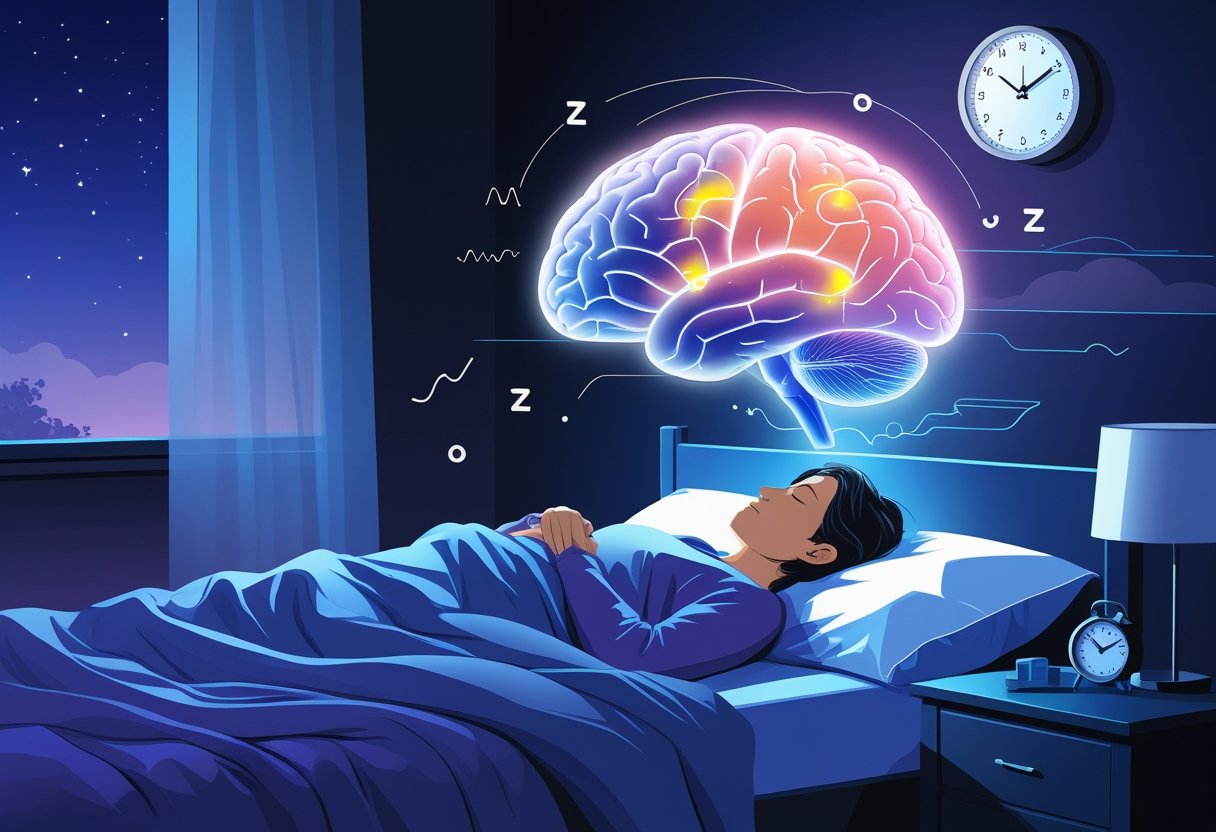
The Relationship Between Alzheimer’s and Sleep
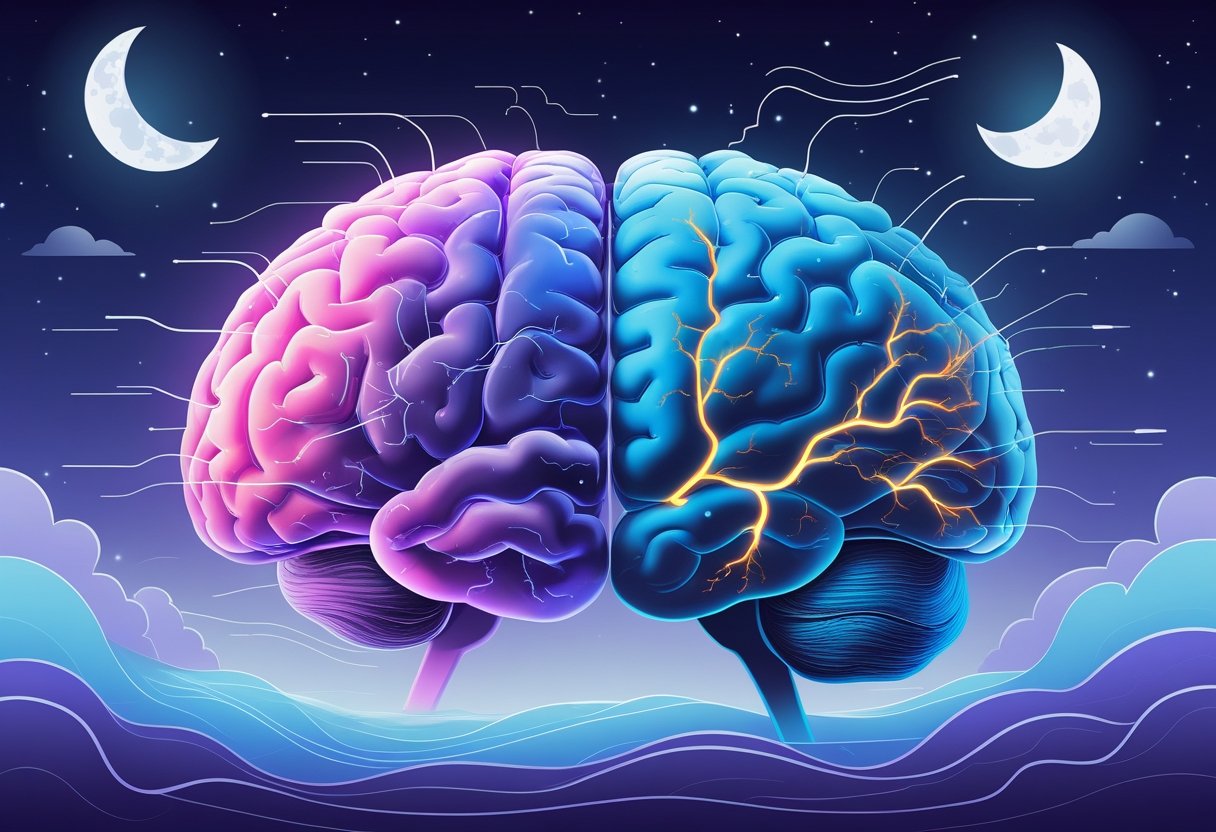
Alzheimer’s disease and sleep are tied together in many ways. Changes in the brain often affect how people sleep, and sleep problems can start showing up before memory loss becomes obvious. As the disease moves forward, these sleep issues usually get worse. This is one reason many people with Alzheimer’s struggle with rest and why researchers believe sleep itself may play a role in the disease.
How Alzheimer’s Affects Sleep Patterns
Alzheimer’s can change the way the brain manages sleep. People often have trouble falling asleep or staying asleep, and their nights are broken up by frequent waking. Deep sleep, the stage that helps the brain recover and store memories, usually decreases. REM sleep, which supports dreaming and emotional balance, also becomes shorter. Because of this, many feel tired during the day or wake at unusual times.
These changes come from damage in the brain areas that control the sleep-wake cycle. As a result, patients may nap more in the daytime and stay awake at night. This shift can throw off their natural rhythm and sometimes leads to confusion or restlessness, making daily life harder for both patients and caregivers.
Scientific Insights Into Sleep and Alzheimer’s Disease
Research shows that sleep and Alzheimer’s influence each other. Poor sleep can raise levels of amyloid-beta and tau, proteins that collect in the brain as part of the disease. Normally, the brain clears these proteins during deep sleep. When deep sleep is disrupted, that process slows down, and damage can build up faster.
Even people without clear symptoms show a link between poor sleep quality and higher levels of these proteins. Scientists note that how well you sleep, such as sleep efficiency and time spent in slow-wave sleep, gives more insight into Alzheimer’s risk than just how many hours you rest. Conditions like sleep apnea may also speed up memory loss and raise the chance of developing Alzheimer’s.
Why Do Alzheimer’s Patients Stay Awake at Night?
Many people with Alzheimer’s struggle most in the evening. This is called “sundowning.” It brings on more confusion and agitation late in the day, often making it hard to settle down for the night. One reason is damage to the brain’s internal clock, which normally regulates sleep and wake cycles. There are also other issues that can add to the problem, such as anxiety, pain, side effects from medicine, or not getting enough daylight exposure.
These factors lead to staying awake at night and sleeping more during the day. Caregivers often notice irregular sleep schedules and even nighttime wandering. Managing these challenges often means creating steady routines, improving light exposure during the day, and checking for treatable conditions like sleep apnea. These steps can sometimes make rest easier and bring more balance to daily life.
Common Sleep Problems in Alzheimer’s Patients
People living with Alzheimer’s often struggle with sleep in ways that affect both their health and daily life. They may have trouble falling asleep, wake up often during the night, or feel restless. Some also stay drowsy during the day. For caregivers, knowing these patterns makes it easier to handle the challenges that come with them.
Alzheimer’s and Insomnia
Insomnia is common in Alzheimer’s. Many find it hard to fall asleep or they wake up several times a night. This happens because Alzheimer’s changes the parts of the brain that control sleep cycles.
Poor sleep makes memory problems worse. Without enough deep sleep, the brain struggles to recover and store information. This can also cause more daytime confusion and agitation. On top of that, other health issues or certain medicines may play a role in sleep trouble. Caregivers should talk to doctors if sleeplessness continues so possible treatments can be considered.
Insomnia and Alzheimer’s
Insomnia and Alzheimer’s are closely linked. Poor sleep can be both a symptom of the disease and something that makes it progress faster. When sleep is disrupted, harmful proteins build up in the brain, which can cause more damage over time.
Research shows that Alzheimer’s often leads to less non-REM sleep, the type that helps the brain heal. This loss makes memory and thinking decline more quickly. Managing insomnia early may help slow down these effects. Non-drug approaches and certain medicines may improve sleep, though side effects always need to be considered.
Nighttime Restlessness
Many people with Alzheimer’s become restless at night. They may get out of bed, wander, or move around without reason. This often comes from confusion or changes in their internal body clock.
Wandering increases the risk of accidents and can disturb others in the home. Simple changes like leaving soft lights on and keeping paths clear can make the environment safer. A calming routine before bed or gentle background music may also help. Medicine can be an option, but the goal should always be safety and better rest.
Daytime Sleepiness and Napping
Another issue is excessive napping. Because nighttime sleep is often poor, people with Alzheimer’s may feel tired and nap a lot during the day. This can lower activity levels and make social interactions less likely.
Too much daytime sleep often makes nighttime sleep even worse, creating a cycle that’s hard to break. Caregivers can support a regular daily routine that promotes alertness. Short naps, if planned well, can still be useful. Getting natural light during the day also helps reset the body’s sleep rhythm and improves alertness.

Causes of Sleep Disruptions in Alzheimer’s Disease
Sleep issues are very common in people with Alzheimer’s. They don’t usually come from one single cause but from several factors happening at the same time. Changes in the brain, shifts in mood or behavior, and the effects of medication all play a role. These factors can connect with each other, making sleep even harder to manage.
Changes in the Brain
Alzheimer’s damages parts of the brain that handle sleep and wake cycles. The hypothalamus and brainstem, which keep the body’s clock running, are some of the first areas affected. When these areas break down, the body loses its natural rhythm.
Deep sleep and REM sleep become shorter, and waking up in the middle of the night becomes more frequent. Because of this, sleep doesn’t feel as restful. Another problem is the buildup of amyloid plaques and tau proteins. These proteins affect brain function and make it harder to regulate sleep. Poor rest can also increase these proteins, creating a cycle that makes both brain health and sleep worse.
Behavioral and Psychological Factors
Alzheimer’s also changes how people act and feel, which can spill over into sleep. Confusion, restlessness, and irritability often get worse later in the day, a pattern known as sundowning. Many people start pacing or can’t calm down before bed, which breaks their routine and makes falling asleep harder.
Anxiety and depression are also common. Both can disturb sleep, and reduced physical activity or less time in the sunlight can throw off the body’s internal clock even more. Together, these habits and emotions disrupt the structure of sleep and cut down the total time someone rests. Together, these factors break up sleep and shorten overall rest time.
Impact of Medications
Treatment for Alzheimer’s often includes medications, and these can have side effects on sleep. Some drugs help with memory or mood but may lead to insomnia, vivid dreams, or excessive sleepiness. Cholinesterase inhibitors, for example, are known to disturb nighttime rest. Other medications for mood or behavior can make someone overly sedated or stop them from reaching healthy sleep stages. On top of that, many people also take drugs for other health problems, such as pain medication or diuretics, which can cause more nighttime waking.
Making small adjustments to a person’s medication plan, or carefully monitoring how different drugs affect rest, can improve sleep quality and make daily life a bit easier.
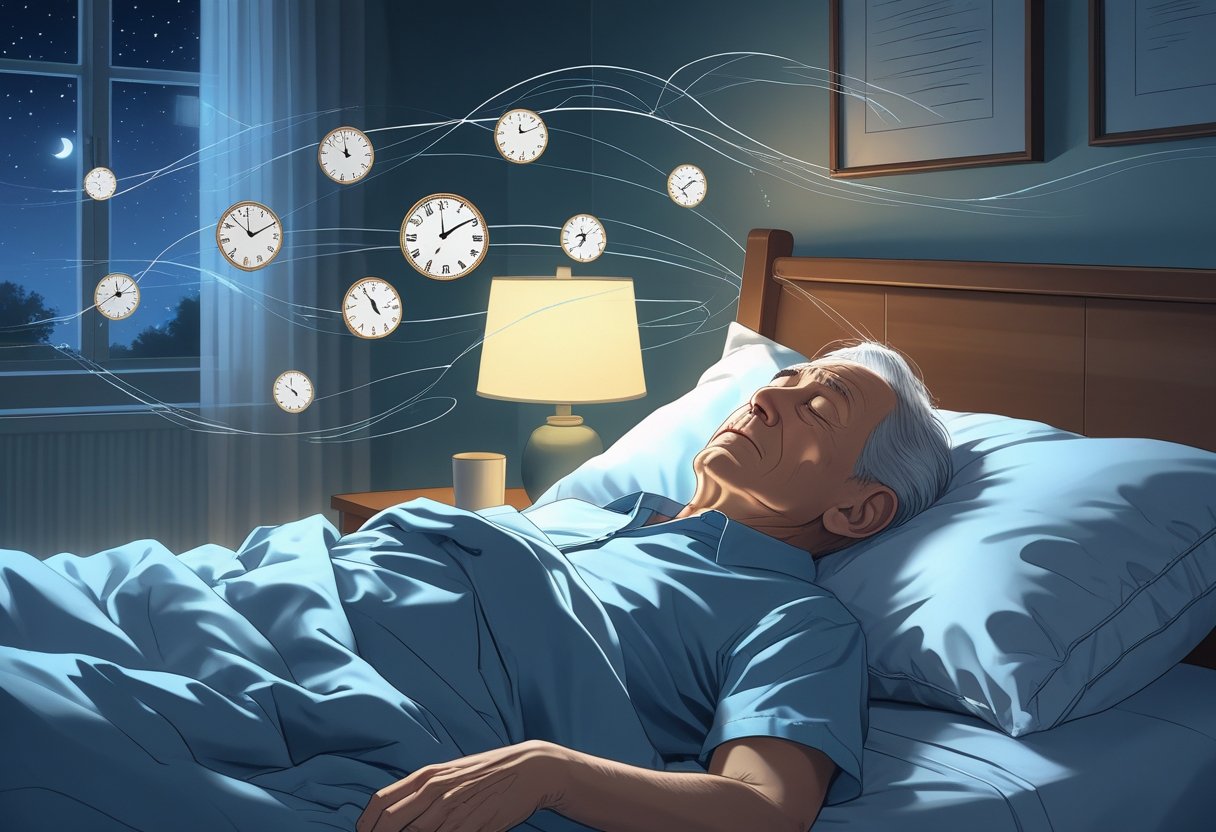
Risks and Health Impacts of Poor Sleep in Alzheimer’s
Poor sleep is common in people with Alzheimer’s disease, and it can affect both the brain and the body. It may speed up memory loss, increase the chance of accidents, and add strain to caregivers. These problems happen because Alzheimer’s changes the brain’s structure and chemistry, both of which are important for memory and clear thinking.
Cognitive Decline and Symptom Worsening
When someone with Alzheimer’s doesn’t sleep well, their symptoms often get worse. Sleep is when the brain clears out harmful proteins like beta-amyloid, which are linked to the disease. Without enough rest, these proteins build up faster, leading to more confusion and memory problems.
Conditions such as insomnia, sleep apnea, or irregular sleep cycles can make symptoms more intense. Studies show that both too little and too much sleep may push dementia to progress more quickly. In fact, sleep issues often appear before major memory decline, making them an early sign to watch out for.
Increased Risk of Accidents
Lack of proper rest doesn’t just affect the brain. It can also make Alzheimer’s patients less steady and more likely to get hurt. Poor sleep lowers alertness, slows down reaction time, and weakens coordination.
Nighttime wake-ups can lead to wandering or disorientation, which can be dangerous. On top of that, sleep apnea can cause daytime tiredness, raising the chance of falls or accidents. These risks show why treating sleep problems is important for safety.
Effects on Caregivers
Sleep troubles affect more than just the patient. Caregivers often struggle with poor sleep too, since they’re up at night helping. This lack of rest leaves them worn out, stressed, and more likely to feel overwhelmed.
Tired caregivers may find it harder to keep up with daily care. Over time, this can lead to burnout. When both the person with Alzheimer’s and their caregiver face sleep issues, it creates a cycle of exhaustion. That’s why support for better sleep needs to focus on both patients and caregivers.
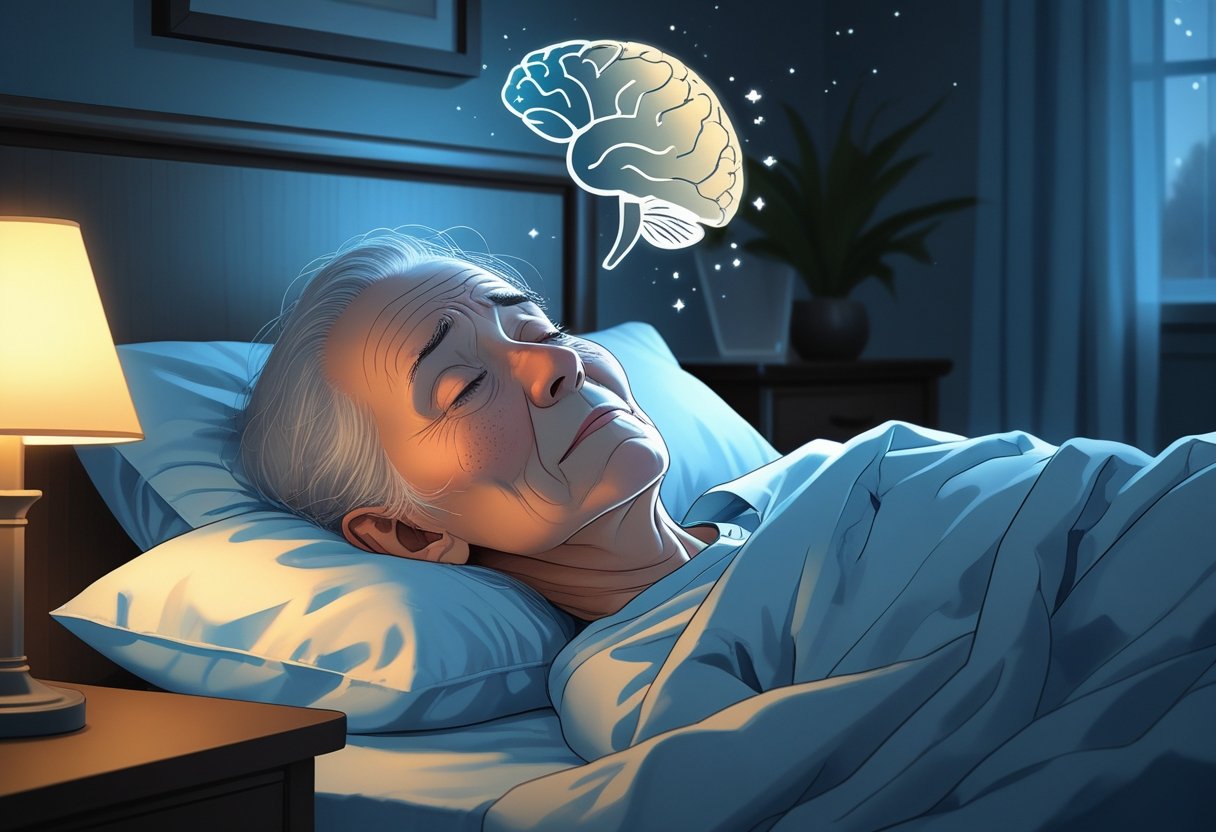
Strategies for Managing Sleep Problems

Managing sleep issues in people with Alzheimer’s involves clear steps to improve rest quality. This includes changes to the environment, daily habits, and, when necessary, medical treatments. Non-drug methods should come first before turning to medications.
Creating a Supportive Sleep Environment
A calm, quiet, and comfortable bedroom helps reduce sleep problems related to Alzheimer’s. The room must stay dimly lit in the evening and free from loud noises or clutter that may cause confusion or anxiety. Temperature also plays a role. Keeping the room cool, not cold, supports better sleep. Familiar items such as favorite blankets or pillows add comfort and a sense of security.
Daytime naps should remain brief to avoid disrupting nighttime rest. Sunlight exposure during the day supports a balanced sleep-wake cycle.
Establishing Healthy Routines
Consistency in daily activities and sleep schedules helps stabilize rest for people with Alzheimer’s. Going to bed and waking up at the same time each day helps reset the body’s internal clock. Evening routines should involve calming activities such as reading or quiet music. Avoid screens and stimulating tasks for at least one hour before bed.
Physical exercise earlier in the day helps improve sleep but should not occur too late, as it may lead to alertness at night. Limiting caffeine and large meals later in the day also reduces sleep disruptions.
Non-Pharmacological Interventions
Non-drug approaches serve as the safest first step for addressing sleep issues in Alzheimer’s patients. Light therapy helps regulate the sleep-wake cycle by increasing light exposure during the day and limiting it at night.
Relaxation techniques such as deep breathing or light stretching lower anxiety and ease the transition to sleep. Behavioral therapy removes habits that disrupt rest and reinforces healthy sleep behaviors. Music therapy or aromatherapy with lavender may also support a soothing routine without introducing side effects.
Medical Treatments for Sleep Issues
Medical options come into play when non-pharmacological methods fall short. Doctors may prescribe sleep aids cautiously, since individuals with Alzheimer’s are often more sensitive to side effects. Treatments might include low-dose sleep aids, melatonin supplements, or medications that target issues such as restless legs or sleep apnea. Any prescribed medication must be closely monitored to prevent worsening cognitive symptoms or causing daytime fatigue.
In complex cases, consulting a specialist ensures proper care and sleep management tailored to the individual’s needs.
When to Seek Professional Help
Sleep problems in someone with Alzheimer’s can range from mild restlessness to serious disruptions. It’s crucial to recognize when these issues go beyond the usual and need expert attention. Spotting the signs of severe disturbances and working closely with health care providers ensures the person receives proper care.
Recognizing Severe Sleep Disturbances
Severe sleep problems often involve consistent trouble falling asleep, waking up multiple times at night, or feeling unusually tired during the day. If the person shows confusion, agitation, or restlessness overnight, it could point to something more serious. Other warning signs include frequent nightmares, nighttime wandering, or the inability to stay asleep despite feeling tired.
These challenges can worsen memory, affect daily activities, and raise safety concerns, especially if wandering is involved. Keeping track of sleep patterns for several days can help determine the seriousness of the issue. If sleep disruptions affect health or lead to extreme mood swings, it’s time to seek professional help.
Consulting Health Care Providers
Doctors usually begin by reviewing the person’s medical history, current medications, and any other conditions that might affect sleep. They might suggest sleep studies or tests to check for problems like sleep apnea or restless leg syndrome. Treatment may involve non-drug strategies first. Providers often recommend adjusting daily routines, increasing natural light exposure, or creating a calmer bedtime atmosphere. Medications may be added later if necessary.
Staying in close contact with health care providers and caregivers is key. They can monitor changes, update treatments, and address any new symptoms related to Alzheimer’s or other conditions. Ongoing support helps maintain safer and more restful sleep.

How Mattress Comfort Influences Sleep Quality in Alzheimer’s Patients
Good sleep depends a lot on comfort, especially for people with Alzheimer’s. When the body is supported the right way, there’s less pain and discomfort at night. This makes it easier to stay asleep and get deeper rest.
People with Alzheimer’s often find it hard to move around in bed. If the mattress feels too hard or too soft, they may feel more discomfort. A surface that eases pressure on the body helps prevent skin sores and makes shifting positions less difficult. The right mattress also helps keep the spine aligned. This lowers muscle stiffness and joint pain, which are common problems that can disturb sleep. Poor rest usually leads to more agitation and restlessness, so proper support is important.
Some benefits of a comfortable sleeping surface for Alzheimer’s patients include:
- Fewer nighttime awakenings
- Lower risk of bedsores
- Longer, more restful sleep
- Better mood during the day
Factors to consider when choosing a mattress:
- Firmness: A balance between soft and supportive
- Pressure relief: Reduces discomfort and protects skin
- Temperature control: Keeps the body cool and comfortable
A mattress like the Novilla Joviality Hybrid can help meet these needs. It blends memory foam with pocketed coils, so the surface adjusts to the body while still feeling stable. This design makes it easier for people with limited mobility to turn and move without added strain. The Novilla Joviality Hybrid also has gel-infused foam and a breathable cover. These features help manage heat and keep sleepers from getting too warm, which is a common issue for Alzheimer’s patients. Staying cool through the night often leads to better rest and a calmer mood the next day.
Choosing the right mattress is just one part of improving sleep for someone with Alzheimer’s. When combined with good sleep habits and a steady routine, it can make nights easier and days more peaceful.

Frequently Asked Questions
Sleep affects how Alzheimer’s develops and progresses. Poor sleep can make memory problems worse and increase confusion. Some people try sleep aids, but these can be risky and sometimes make symptoms harder to manage. Researchers are still studying how better sleep might lower the chances of developing Alzheimer’s.


